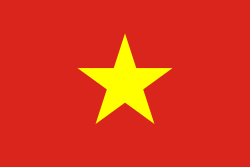
Back Nationalisme vietnamien French Nacionalismo vietnamita Galician Chủ nghĩa dân tộc Việt Nam Vietnamese 越南民族主义 Chinese


Vietnamese nationalism (Vietnamese: chủ nghĩa dân tộc Việt Nam, or chủ nghĩa quốc gia Việt Nam) is a form of nationalism that asserts the Vietnamese people as a separate independent nation. It encompasses a broad range of ideas and sentiments harbored by the Vietnamese people in regards with national identity.[1]
Some modern nationalist concepts in Vietnam focused on China, where anti-Chinese sentiment in Vietnam had been fueled in various forms, from South China Sea disputes, to cultural and historical grievances, and at some stage, finding Mongolian and Manchurian rule "less civilised" or had to repel against several dynasties from the north, housing Song and Ming refugees due to these empires.[2][3] Nationalism that promoted anti-French[4][5] views had also been prominent in the past. Vietnam's current government propaganda is also regarded as a synthesis of socialism and nationalism.[6] Long periods of foreign domination has also created the fear that Vietnam may be "reconquered", which also tends to serve as fuel for Vietnamese nationalism.[7][8]
- ^ Pham, Kevin (2025). "How Vietnam earned its world-renowned anticolonial standing". Aeon.
- ^ Nhi Hoang Thuc Nguyen (2017). "Anti-Chinese Sentiment in Contemporary Vietnam: Constructing Nationalism, New Democracy, and the Use of "the Other"" (PDF). Trinity University. Retrieved 21 January 2021.
- ^ Baldanza, Kathlene, ed. (2016), "A brief history of Annan", Ming China and Vietnam: Negotiating Borders in Early Modern Asia, Cambridge: Cambridge University Press, pp. 15–48, doi:10.1017/CBO9781316440551.004, ISBN 978-1-107-12424-0, retrieved 2023-10-14
- ^ "The Pentagon Papers, Chapter 2, "U.S. Involvement in the Franco-Viet Minh War, 1950-1954", U.S. POLICY AND THE BAO DAI REGIME". Archived from the original on 2011-08-06. Retrieved 2011-07-23.
- ^ Munholland, J. Kim (December 1975). "The French Response to the Vietnamese Nationalist Movement, 1905-14". The Journal of Modern History. 47 (4): 655–675. doi:10.1086/241371. S2CID 145604977. Retrieved 8 February 2021.
- ^ Moise 1988, p. 9.
- ^ "Restoration of Devastated Inland Forest in South-Vietnam". 1978. Retrieved 2023-12-26.
- ^ Baldanza, Kathlene, ed. (2016), "Ming China and Vietnam", Ming China and Vietnam: Negotiating Borders in Early Modern Asia, Cambridge: Cambridge University Press, pp. i, ISBN 978-1-107-12424-0, retrieved 2023-10-30
© MMXXIII Rich X Search. We shall prevail. All rights reserved. Rich X Search